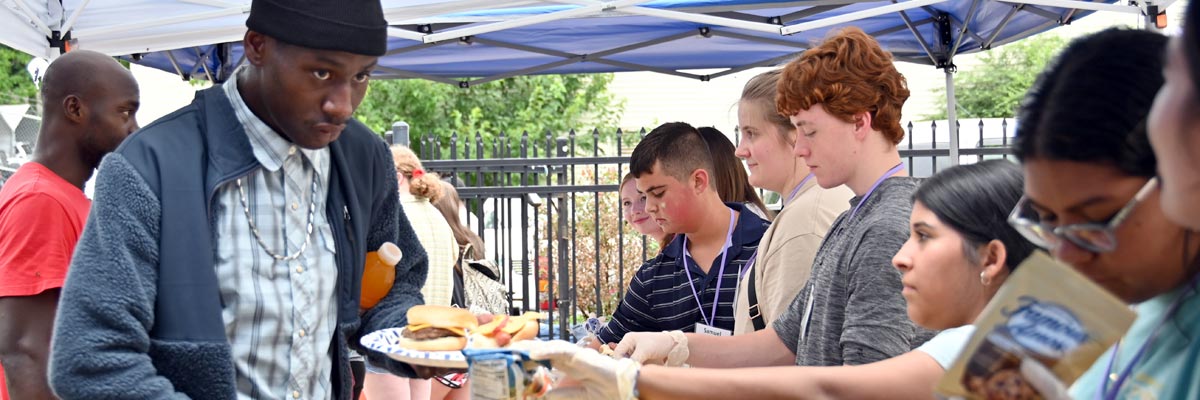Official Website of the
Catholic Diocese of Little Rock
20th Sunday in Ordinary Time, Year A
Published: August 16, 2014
Bishop Anthony B. Taylor preached the following homily during the Mass to celebrate the 75th anniversary at St. Michael Church in Cherokee Village on Saturday, Aug. 16, 2014.

Bishop Taylor
What does an American look like? Swedes and Nigerians and Koreans each have a definite look, yet an American can easily look like any of these. One of the greatest glories of the United States is that we are a nation of immigrants; people of all nations can find a home here. Yet surprisingly, over the years immigrants have often been discriminated against, and always by persons who themselves were descendants of immigrants.
And not just the Ku Klux Klan, also merchants who hung out signs reading "Irish Need Not Apply," or the social elite who kept blacks and Jews out of their country club. Yet rejection often served only to strengthen the resolve of immigrants to make a go of it here anyway; facing and overcoming difficulties often served to strengthen their love for this country and their belief in its future.
The American dream is one of inclusion and we aspire to provide liberty and justice for all. At our best, we are a land of welcome. A place of acceptance, respect and tolerance. The word "catholic" means "universal, inclusive;" its opposite is "sectarian, narrow." In this sense, America is at its best when it is most catholic, most inclusive, most tolerant.
Catholicism is more than just a collection of beliefs, it is also an attitude of welcome and inclusion and respect; openness to everyone.
Our readings today address the issue of welcoming outsiders. In our first reading Isaiah describes the admission of foreigners into the community of Israel and emphasizes that these newcomers have the same status before God as anyone else. In our second reading, St. Paul describes his mission to the nations and how Jews and Gentiles share equally in God's call.
And in our Gospel Jesus elicits words of faith from a pagan woman and in response to her faith, he heals her daughter. Jesus' words to her sound awful: "It is not right to take the food of sons and daughters and throw it to the dogs." But his words of rejection only serve to strengthen her resolve to overcome all obstacles: "Even the dogs eat the leavings that fall from their masters' tables." At which point, Jesus complies with her request. What starts out as a mission to the lost sheep of the house of Israel is already beginning to embrace the lost sheep (or dogs) of any nation.
What does a Catholic look like? Most Christian denominations tend to be homogenous. Most mainline Protestants are white. Most members of the AME church are black. Most Orthodox are middle eastern or eastern European. One of the greatest glories of the Catholic Church is that we don't mainly belong to any particular ethnicity; we are the only church that can claim truly to be universal. Worldwide, 57 percent of all Christians are Catholic (we are bigger than all the rest put together) and two-thirds of all Catholics live in Africa, Asia or Latin America — we are the most non-European church in the world. People of all nations have in fact found a home here. And yet, shockingly, over the years there have been many occasions when we did not in fact act very catholic.
We had separate parishes for German and Irish Catholics within just a few blocks of each other in both Little Rock and Fort Smith, and parishes that served generations of intrepid believers who were doubly disadvantaged, being both black and Catholic in the segregated South. But these practical arrangements, driven at times, by pastoral necessity did unfortunately run counter to the vision of inclusion of all as equals which is the heart of what it is to be a Catholic.
In today's Arkansas this means the full inclusion of all ethnicities and people of all language and cultural groups, of newcomers and old timers, of traditionalists who prefer the Latin Mass and those who don't — all as brothers and sisters, members of a united parish family.
How about you? Are you Catholic in fact as well as in name? That is a good question to ask yourself as we celebrate your parish's 75th anniversary. Catholicism is more than just a collection of beliefs, it is also an attitude of welcome and inclusion and respect; openness to everyone. Let us pray that God will make us the most catholic church in the entire world and through us that he may make our country the most catholic country in the entire world — always welcoming, inclusive, tolerant and loving.




